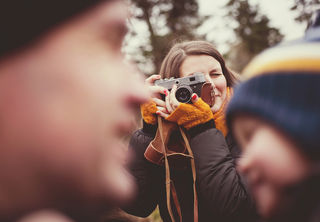Howard S. Friedman Ph.D.
Secrets of Longevity
Stop just one habit and your days may feel twice as long and twice as rich.
Posted Feb 25, 2014
 A little-known secret to staying healthy and living longer involves
discarding your camera. A side benefit is that this also increases your happiness
and general sense of well-being. If your camera is built into your
smart phone, a suitable alternative is to bury that feature so it is
hard to find and access.
A little-known secret to staying healthy and living longer involves
discarding your camera. A side benefit is that this also increases your happiness
and general sense of well-being. If your camera is built into your
smart phone, a suitable alternative is to bury that feature so it is
hard to find and access.I must admit that I was surprised when I uncovered this marvel, and have since placed it right alongside staying physically active, being involved with others in healthy social networks, and eating whole foods. I first got the idea to look into this phenomenon a few years ago, when I noticed that cameras seemed to be proliferating at every interesting, significant event. Whether a concert, a sporting event, or just a beautiful day outdoors, I saw that most people had cameras out and were recording. I noticed that this soon spread to food—restaurants, picnics, and elegant dinners—as more and more individuals took pictures of their meals and uploaded them to social media sites.
In my work on the Longevity Project, which I have been engaged in for more than 20 years, we have been studying more than 1,500 bright Americans who were first examined as children in the 1920s. They were followed for their whole lives, and we have evaluated how well they aged and how long they lived. We ask: Who lives long, healthy, and thriving lives, and why? We then confirm the results by examining other studies. Many of the participants do indeed live very long, happy, healthy lives. I recently talked to one who is now 102.
Yet the thrivers were not photographers.
YouTube reports that 100 hours of video are uploaded to its platform every minute, and that its users watch more than 6 billion hours of video each month. And YouTube is only one of many sites to which people upload pictures and videos. More than 55 million Instagram photos are posted each day. And of course many more pictures and videos are never uploaded at all.
Let's say that you use your camera for one hour a day—really not that much if you are taking pictures and videos of your child or your dog at play; a street performer; a concert in the park; a surfer; a skier; a party; the mall; your meals; the sky; an amusement park; a fashion show; a Little League game; a sorority gathering, and on and on. Some days you may not take any pictures or videos; other days, you take many.
Most people only have about three or four hours a day of free or flexible time (after sleeping, working, commuting, bathing, dressing, and so on). So an hour a day might be a quarter or a third of your total available free time. But the kicker really is the time you spend viewing your videos or pictures. If you record a two-hour concert, then you are likely to view it later, at least once. Or else why take the pictures? So many people not only spend a significant chunk of their free time behind their cameras, they then spend at least that much time later viewing what has been recorded!
The camera itself can diminish our experience. I prefer to concentrate on the events around me rather than squinting through a viewfinder or hiding behind my iPad. Even if your experience of an event is not diminished by recording it, you still give up the potential thrill of new events while reviewing the old.
In The Longevity Project and in other well-constructed scientific studies, the happiest, healthiest, and longest-living individuals tend to be those who are creating things, doing things with others, or helping others. (Productive work predicts good health; it is not "stressful.")
I love to look at the pictures hanging on my wall or on my desktop as much as anyone. These are images of loved ones or of scenes from terrific vacations. But I learned from our studies of health and longevity that although the thrivers and survivors are indeed prudent and planning for the future, they are not recording half their lives so that they can spend the other half watching their recordings.
With the camera off, life lived cannot only seem but also really be twice as long.
没有评论:
发表评论